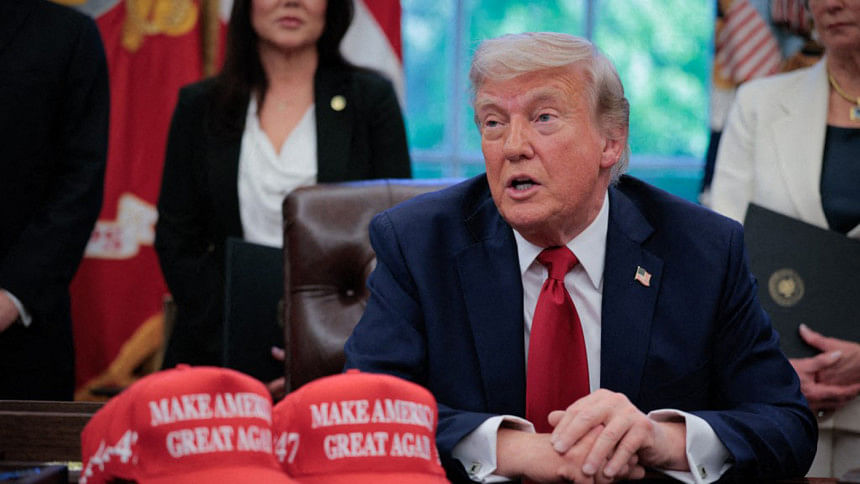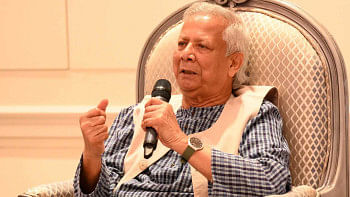Trump seeks 'fair deal' with China but pathway unclear

US President Donald Trump on Wednesday played up prospects of a "fair deal" on trade with China, but his top officials offered few details of how Washington might de-escalate its damaging tariff war with Beijing.
Trump told reporters his country would have a "fair deal with China," adding that "everything's active" when asked if Washington was talking to Beijing.
But how soon the tariffs can be lowered "depends on them," Trump said, referring to Beijing, even as he maintained that he gets along "very well" with Chinese President Xi Jinping and hopes they can reach an agreement.
Trade tensions between the world's two biggest economies have soared as Trump ramped up levies on imports from China this year, imposing an additional 145 percent tariff on many products over practices Washington has deemed unfair, and other issues.
Beijing in turn has countered with new 125 percent tariffs on US goods.
Despite signals that Washington is looking towards a fair agreement, the state of discussions remains murky.
Asked if there is direct US contact with China on trade, Trump said: "Every day."
But earlier Wednesday, US Treasury Secretary Scott Bessent told reporters that the two countries are "not yet" talking when it comes to lowering tariffs.
"I think both sides are waiting to speak to the other," he said at an event on the sidelines of the International Monetary Fund and World Bank's spring meetings in Washington.
He added that there is no unilateral offer from Trump to slash duties on Chinese goods.
- 'An embargo' -
Bessent said the staggeringly high tariffs both countries have imposed on each other's goods have to come down before negotiations can occur.
"I don't think either side believes that the current tariff levels are sustainable, so I would not be surprised if they went down in a mutual way," he added on the sidelines of an Institute of International Finance forum.
"This is the equivalent of an embargo, and a break between the two countries in trade does not suit anyone's interest," Bessent said, stressing that "de-escalation by both sides is possible."
But he had no timeframe on how soon bilateral talks could take place.
"It's both a blessing and a curse that the strongest relationship is at the very top," Bessent said, referring to Trump's ties with Chinese counterpart Xi. But with "any de-escalation, the talks would not begin at the very top."
Joseph Grieco, professor of political science at Duke University, told AFP that Trump may continue to chase China for a deal "to keep the financial markets off his back."
"I worry Trump will eventually offer President Xi a favorable deal, one that doesn't address the serious economic problems the US actually has with China," he said.
While Trump has swiftly rolled out sharp tariffs on different countries and sectors, he has also been quick to introduce certain exemptions -- most recently some temporary reprieve for tech products like smartphones and chipmaking tools.
And he could widen the carveouts, the Financial Times reported Wednesday, saying Trump could exempt car parts from some tariffs on Chinese imports -- alongside those on steel and aluminum.
On Wednesday afternoon, Trump said he was not considering changes to US auto tariffs but noted that levies on Canada could rise in terms of cars.
Separately, Bessent said he did not have a stance on whether the president had the authority to fire Federal Reserve Chair Jerome Powell if he wanted to.
He suggested Trump's previous comment that the "termination" of Powell could not come fast enough might also refer to the end of the Fed chief's term.
Earlier Wednesday, Bessent said in a speech that Beijing's export-reliant economic model is "unsustainable" and "not only harming China but the entire world."
He stressed US concerns around trade imbalances that the Trump administration says it hopes to address through sweeping tariffs.
But Bessent maintained that "America first does not mean America alone."
He insisted the administration's moves are broadly a call for deeper collaboration and mutual respect among trading partners, while taking aim at policy choices by other countries that he said have hollowed out US manufacturing and put its security at risk.

 For all latest news, follow The Daily Star's Google News channel.
For all latest news, follow The Daily Star's Google News channel. 



Comments